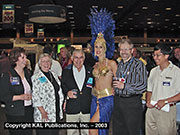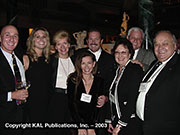
December 2003 Issue Highlights
For more complete coverage, send us an e-mail to
request a back issue.

For more complete coverage, send us an e-mail to
request a back issue.

Western Carwash Association Convention & Tradeshow

Society of Independent Gasoline Marketers of America Fall Meeting
Want to see the photos that didn't make the issue? Check out
the Cutting Room
Floor.
ConocoPhillips Sells Circle K C-Stores to Couche-Tard
Shell To Shut Down California Refinery
Brown Bear Founder Buys Back Washes
Noon's Shuts Helena Downtown C-Store
Stolen Lotto Ticket Costs $8 Million
PHOENIX, AZ. — Ending months of speculation as to who the buyer would be, ConocoPhillips has agreed to sell its convenience store chain Circle K to the Canadian firm Alimentation Couche-Tard. The purchase also includes the rights to the Circle K brand.
The terms of the deal include a payment of $850 million to ConocoPhillips as well as assumption of $9.1 million in the company's debt.
As part of the deal, ConocoPhillips will sell fuel to Couche-Tard to supply the Circle K stores "at market prices" for the next two to five years. The fuel sale involved is estimated at 1.2 billion gallons of gasoline per year.
At the time of the acquisition, Alimentation Couche-Tard operated 2,500 convenience stores across Canada and the Midwest with 20,100 employees. The Circle K acquisition will add 1,663 company operated c-stores and 350 franchised and licensed stores to the company, many of which are located in the West. Approximately one-quarter of the locations — 525 c-stores — are located in Arizona where Circle K was headquartered.
Approximately 17,400 ConocoPhillips employees associated with the Circle K brand also will move to Couche-Tard; the majority are expected to be offered similar positions with the Canadian company.
With the divestiture of the Circle K c-stores, ConocoPhillips retains approximately 350 retail outlets, primarily in the West and Midwest, operating under the 76, Conoco, and Phillips brands.
ConocoPhillips officials had announced earlier in the year that they planned to "sell a substantial portion" of their marketing assets "and exit certain geographic markets." The Circle K sale is seen as only part of that strategy.
"Completion of this sale will mark the beginning of a stronger focus on our wholesale channels of trade," said Jim Nokes, ConocoPhillips executive vice president of Refining, Marketing, Supply, and Transportation. "The sale of this business and various retail marketing asset packages will enable us to re-allocate capital to projects that provide higher returns."
The sale is expected to close by the end of the year.
BAKERSFIELD, CA. — Shell Oil Products has announced that they will shut down their Bakersfield refinery by October 1, 2004.
The closing of the refinery had been expected by local jobbers as the 70,000 barrel per day facility was designed to process San Joaquin Valley heavy crude. As the local supply has fallen off in recent years, Shell officials said it was "no longer economically viable" to continue to run the facility.
The refinery was originally opened in 1932. While it has a capacity of around 70,000 barrels per day, it is currently producing approximately 20,000 barrels per day. The facility supplies approximately 2% of California's gasoline and 6% of the state's diesel.
The refinery currently employs 400 people, 100 of whom are contractors. Shell says they will look for positions for its workers elsewhere in the company.
"While the decline in crude availability has been the major factor in the timing of this decision," said Lynn Elsenhans, CEO of Shell Oil Products U.S., "this closure is just one part of an overall effort to optimize our portfolio and improve SOP U.S.'s performance towards achieving its targeted goals."
To keep fuel moving into the Central Valley, Kinder Morgan has announced that they will reverse the flow of their pipeline currently running from Bakersfield to Fresno. When the Shell refinery shuts down, the pipeline will run from Fresno to Bakersfield, causing potentially tighter supply in Northern California.
The refinery closure will stretch fuel supply in California "a little thinner," said Claudia Chandler of the California Energy Commission. "It increases our vulnerability and certainly the spike potential in a volatile market, especially as it relates to diesel."
SEATTLE, WA. — After selling his carwash chain to Tosco eight years ago, Vic Odermat and his company, Car Wash Enterprises, have bought back Brown Bear Car Washes.
In 1995, Car Wash Enterprises signed a long-term lease with Tosco Refining, transferring all operations of the Brown Bear Car Wash chain to the company. Tosco had originally planned to expand the chain from its base of operations in the Pacific Northwest.
With major oil consolidations, however, ConocoPhillips had control of the lease. ConocoPhillips was not interested in growing the brand and Odermat and his company were able to buy back the carwashes for an undisclosed amount.
Vic Odermat, who founded the Brown Bear chain 41 years ago, is serving as president of the company. His son, Lance Odermat, is serving as vice president and legal counsel.
Odermat says they are returning to their old formula for success. The company re-established their dress code of white shirts and ties for employees and says they are hiring area managers to supervise line employees.
The company says they are going to upgrade the equipment at the carwashes and add at least two new locations a year in the Puget Sound area.
Brown Bear Car Washes currently operates 18 automatic and 10 self-service carwashes in the Puget Sound and Spokane areas.
HELENA, MT. — Noon's, the only gasoline station and convenience store operating in downtown Helena, has closed its doors. The location on North Main has been purchased by Starbucks which will open its third coffee shop on the site.
Noon's Vice President Bill Nooney told local reporters that they chose to close the store because the location was not profitable. Noon's had closed a c-store on the corner of Montana and 11th Avenue earlier in the year for the same reason.
Local residents are mourning the c-store, which was the only 24-hour business in the area.
"I usually get my tobaccos and beers here," said a local resident. "I don't even know where the other stores are."
RANCHO CUCAMONGA, CA. — A jury has awarded $8 million to a convenience store clerk who reported she had a winning lottery ticket stolen from her by her supervisor at Circle K.
Arwa Farraj, 27 has been working at the Circle K as a cashier for two weeks when she purchased a Super Lotto ticket for the California lottery in 1999. After the drawing, she inserted the ticket into the machine that told her she had a winning ticket.
Farraj says she then took the ticket to Gurinder Ruby, her store manager. In her lawsuit, she claims that Ruby took the ticket into the back office and told her she had an $88 winner and gave her $88. He then kept the ticket and 10 days later went to the Lottery Commission and claimed the ticket — worth $8 million — for himself.
A month later, Farraj says that she heard about Ruby's lottery win, which totaled approximately $2.5 million after taxes. Farraj filed a report of a stolen lottery ticket and told her story to the police who, in turn, turned the case over to Lottery investigators.
Lottery officials said they had already paid the money to Ruby by the time Farraj made the report of the stolen ticket.
Farraj then filed suit against Ruby and ConocoPhillips, the parent company of Circle K and the jury found for the plaintiff.
Farraj's Attorney Browne Greene said they included Circle K in the lawsuit because "We asked them to admit the employee was acting in the course and scope of his employment. They put in his hands all operations, which means selling lottery tickets."
Green said he plans to collect the $8 million jury award from Circle K.
Originally published in the December 2003 issue of O&A Marketing News.
Copyright 2003 by KAL Publications Inc.
Serving the 13 Western States, the World's Largest Gasoline, Oil, Fuel, TBA and Automotive Service Market